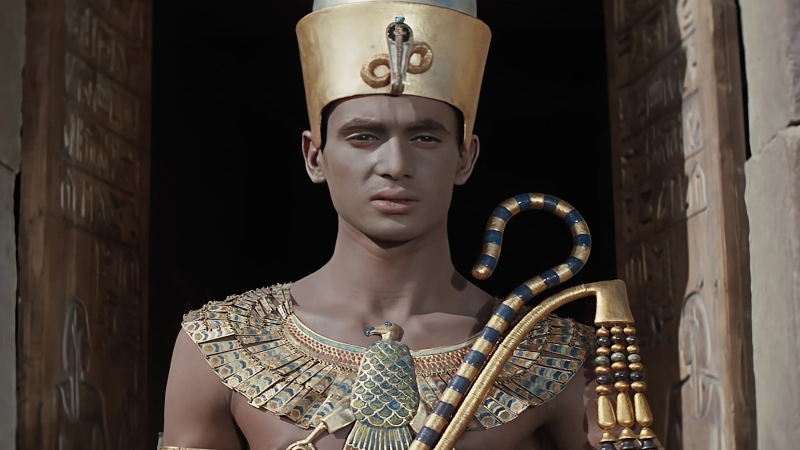Director – Jerzy Kawalerowicz – 1966 – Poland – Cert. 12 – 152m
*****
The reformist zeal of a youthful heir to the Ancient Egyptian throne confronts the immovable conservative tradition of the priesthood of the god Osiris – on Blu-ray from Monday, September 16th
There is nothing else in cinema quite like Pharaoh. That was my impression watching it, and although in such instances you always wonder if there are films of which you’re unaware that lie in a similar vein, this impression is confirmed by watching the Blu-ray’s excellent, 70 minute-odd afterword by critic, curator and scholar Michal Oleszczyk, which contextualises the film by detailing (1) the source novel by Boleslaw Prus, (2) its place in director Kawalerowicz’s wider body of work, which also includes Mother Joan of the Angels (1961) and (3) its significance in both 1960s international film culture and wider Polish history.
This disc extra isn’t meant to be watched until after the film has been viewed, not least because it contains a number of spoilers, so I’ll say no more about it in this review except to say that it’s an excellent and worthwhile extra that will add much to the viewer’s appreciation of the film.
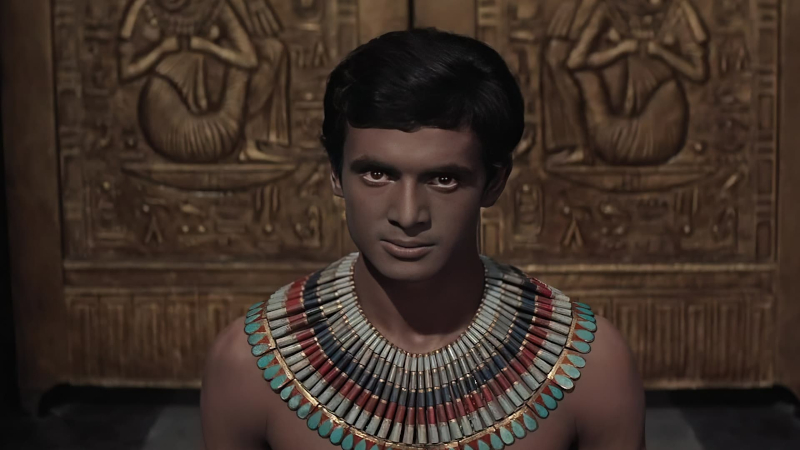
Ramses (Jerzy Zeinik) is the son and heir of Egyptian Pharaoh Osiris-Ramses XII (Andrzej Gertier). In time, if all goes as expected, he will himself become Ramses XIII. As both the ruler and the personification of a god – the ancient world’s version of a personality cult – the pharaoh would appear to possess ultimate power.
However, in practice, Egyptian society is a rigid and highly stratified class system in which the monarch’s ability to direct affairs of state is tempered by the powerful priesthood whose rules appear to permeate and govern every aspect of Egyptian life as Ramses experiences it. Osiris-Ramses XII appears to have bought into this system, while the youthful Ramses is appalled by it and wants to change the status quo.
Nowhere is this state of things more apparent than the opening, a static shot of two Scarab Beetles fighting over a ball of dung. There creatures were sacred in Ancient Egypt, so much so that, here, a marching army must be diverted into a much more difficult route – involving the filling in of a watercourse and the hanging of the slave who has been promised his freedom for bringing water to the area once construction is complete – to avoid the diminutive beasts being trampled.
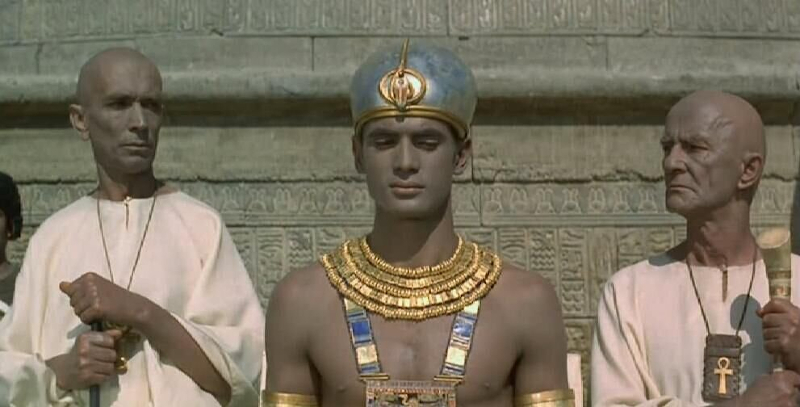
Chief among the hierarchy who ensure that things continue to be done as they always have been are head priests Herhor (Piotr Pawlowski) and Mephres (Stanislaw Milski), while another priest Pentuer (Leszek Herdegen) further down the pecking order, who has Ramses’ ear, is more sympathetic to change as someone whose parents were common manual labourers.
It’s a heavily male-dominated society in which, for example, Ramses’ Jewish partner Sarah (Krastyna Mickolajewska) wields little power, although certain women such as Osiris-Ramses XII’s wife Nikotris (Wieslawa Mazurkiewicz) play no small part in the constant political wrangling and manipulation going on behind the scenes.
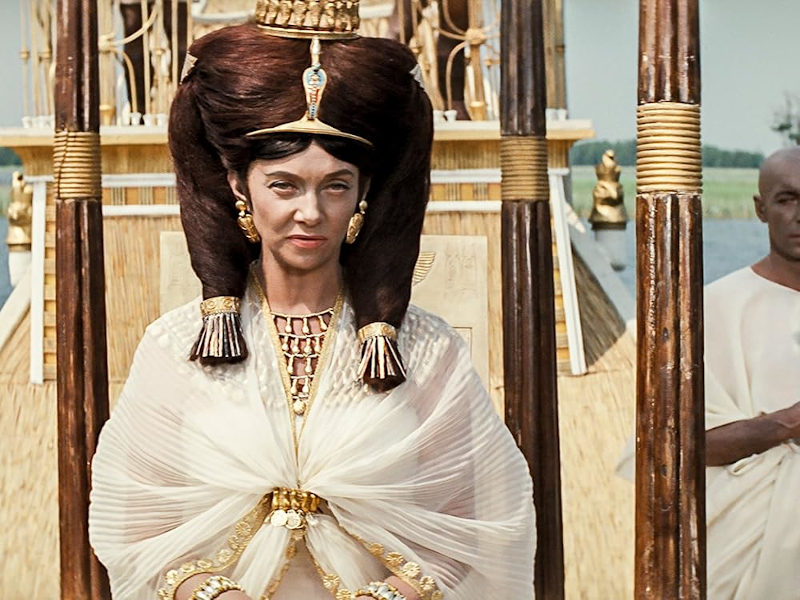
Further intrigue is supplied by several minor characters: Ramses’ double Lycon (Jerzy Zeinik again in a similar setup to the ones in Kagemusha, Akira Kurosawa, 1980 and The Devil’s Double, Lee Tamahori, 2011), in the control of the priesthood via the woman for whom he’ll do anything; a rogue priest with an intimate knowledge of the layout of the labyrinth in which the priests’ treasure is stored; and crafty Phoenician banker Dagon (Edward Raczkowski) who takes advantage of Ramses’ trust to financially exploit the Egyptian state.
Unlike the campy Biblical and / or ancient world Hollywood epics of yesteryear (Land of the Pharaohs, Howard Hawks, 1955; The Ten Commandments, Cecil B. DeMille, 1956; Cleopatra, Joseph L. Mankiewicz, 1963), Kawalerowicz shoots with pared down precision. The pace is measured as the narrative slowly proceeds to its startling conclusion. The whole thing is very straight-faced, apart from some of the scenes with women as love interest or seductresses and one lengthy (not particularly explicit) orgy scene. There’s a feeling of rigour to both the performances and the execution of the whole.
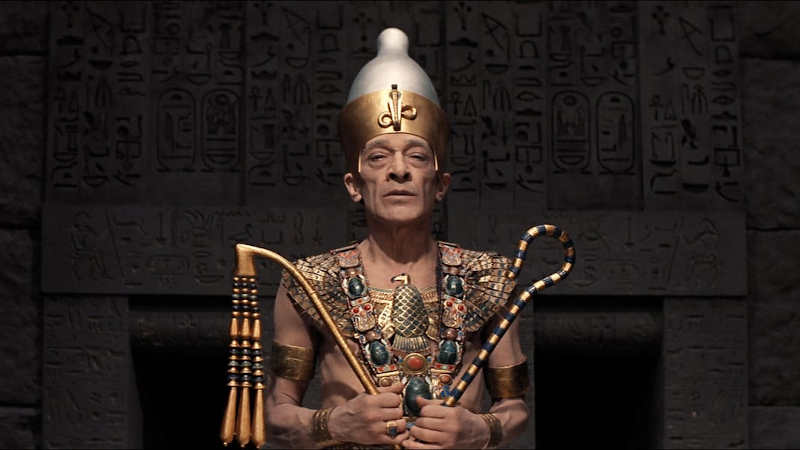
A striking sense of ritual pervades the piece. Early on, a man runs through the ranks of a marching army to deliver a message about changing the marching route of the soldiers so as to protect the sacred beetles in their path. Mourners wail as the body of a deceased ruler is ceremonially carried down a corridor (viewed today, it made me think of the Dear Leader in North Korea).
For the climax, Herhor attempts to avert the sacking of Osiris’ temple by calling on the god at the moment of an eclipse of the sun (skilfully wrought by turning the colour palette momentarily into black and white).
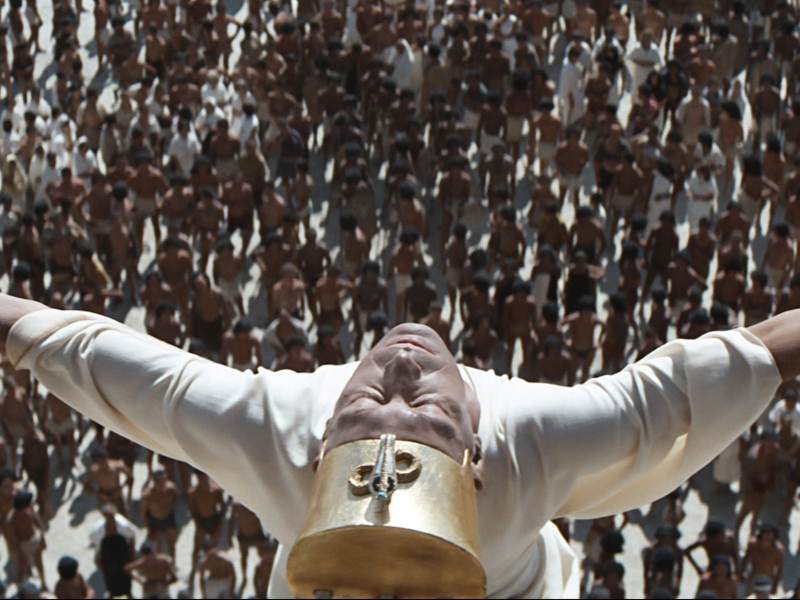
The use of religion is portrayed primarily as an instrument of social manipulation to control both the masses and those further up the social scale, including the ruler. The film bares its political agenda, though never hamfistedly so, in Pentuer’s expressed desire for reform which goes against everything the regime’s political system represents.
Visually, the palette largely comprises whites, blacks, yellows and browns, contributing to the sense of heat and desert (many of the exteriors were shot in Uzbekistan). These colours carry over into palace corridors and interiors. The sets, costumes, statues and other artefacts feel as though a lot of research and effort has gone into their realisation. The monarch must hold sacred objects linking him to the god Osiris in the form of a crook and a flail, one in each hand, suggesting that he is just as trapped within the overall socio-political-religious system as he possesses control over it. When Herhor momentarily wears the sacred crown for a day, the priest verbally delivers to the pharaoh a protocol justifying his doing so.
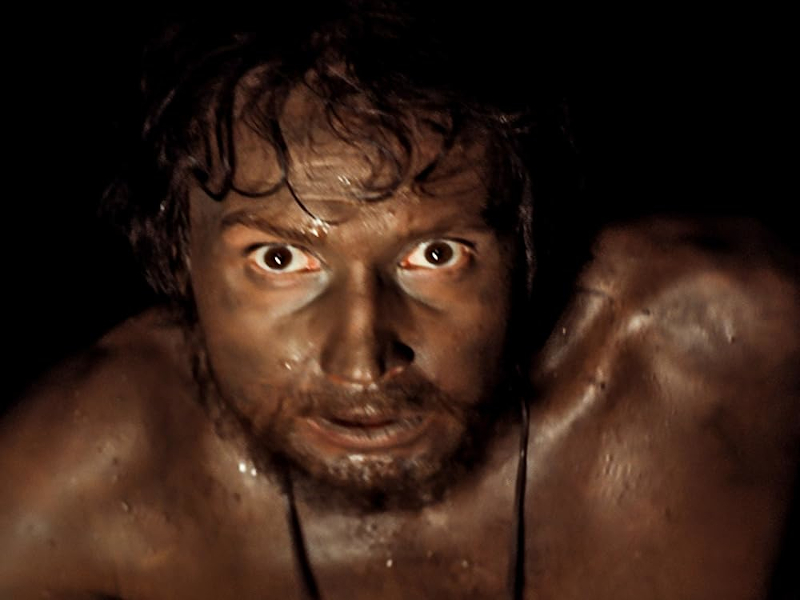
At the centre of the narrative – and the production design – is the labyrinth, a series of tunnels to be navigated with the aid of a burning torch by those who know the route, and perilous for anyone either lacking that knowledge or discovered somewhere in there they are not supposed to be. It feels like the heart of the oppressive regime, a literal ‘heart of darkness’ only to be entered with a supply of lethal poison on one’s person in case of discovery.
To English speakers familiar with Hollywood sword and sandal epics of yesteryear, watching ancient Egyptians speaking Polish initially feels a little odd, yet you adjust to it after a while. The whole is engrossing from the get-go, and you will feel neither bored nor manipulated. Surprisingly, for a film made over half a century ago, it feels surprising modern. One has to admire both its distinctive style and its unwavering sense of purpose.
Pharaoh is out on Blu-ray in the UK on Monday, September 16th.
Trailer:
Modern trailer:
